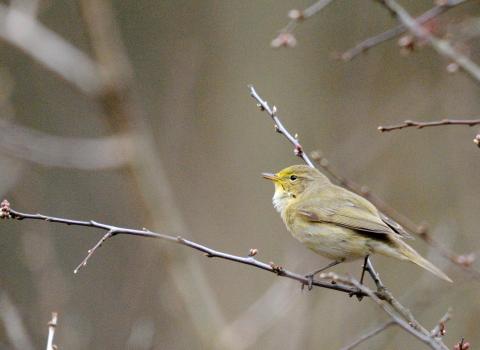Bluebells at Warburton's Wood
Woodland
Cheshire is one of the least wooded counties
Less than 10% of Cheshire has woodland cover, with only 4.7% broadleaved
Our woodlands range in age from long-standing forests through which our ancestors hunted to modern-day plantations which provide materials for building and paper. Among Cheshire’s best-known wooded landscapes are Delamere Forest and Macclesfield Forest, both popular destinations for visitors.
Why are woodlands important?
Woodlands define the landscape and, whether ancient or newly planted, provide homes for thousands of species of plants, animals and fungi. For people, they provide places to explore and connect with nature and a sense of well-being. They absorb noise, pollution and carbon dioxide, they release oxygen and reduce flooding. By managing woodlands sustainably and establishing the ancient woodlands of the future, we are safeguarding a habitat that nurtures both wildlife and people.
Are you interested in creating new woodland?
We’re in the midst of an ecological and climate emergency, and one way we’re taking action is by creating new woodland across Cheshire.
There are lots of ways you can get involved in creating new woodland:
- Planning a tree planting project as a group or organisation? Explore our guidance to get started.
- Looking to volunteer? Keep an eye on our current opportunities to help plant trees across the county.
- Own land or manage a farm? We can support you with expert advice and help you access funding to create new woodland, plant trees, hedgerows, orchards, or other nature-friendly features.
- What makes our landowner support offer unique?
We work closely with you to design a tailored woodland scheme, offering support with permissions, design, planting, infrastructure and maintenance— with up to 100% funding.
By working with us, you’ll receive:
- Expert advice to assess and identify suitable sites
- A bespoke woodland design and planting plan
- Full support with all regulatory processes and permissions
- Site checks to ensure suitability
- Site preparation and any necessary infrastructure (e.g. fencing)
- Full delivery of planting
- A maintenance payment to help you manage your woodland over the long term
- These nature-based solutions can sit alongside productive farming, while boosting biodiversity, storing carbon, and creating lasting change for future generations.
📧 To find out more or discuss your ideas, contact us at: naturerecovery@cheshirewt.org.uk
Our approach to woodland creation
Tree Planting
Tree planting helps mitigate climate change, and when done sensitively, it also provides essential wildlife habitat. Ecologically functional woodlands are complex systems that take time to develop and require careful planning and long-term management.
We focus on planting a diverse range of native broadleaved trees, creating the best habitats for wildlife and nature. Where possible new woodlands should connect existing habitats to provide corridors and enhance what is there already.
We source trees either from our own Cheshire Wildlife Trust nursery where we are growing native trees from seed sourced locally, or from local nurseries to ensure local provenance to achieve the best possible results.
We don’t use plastic, we use fully biodegradable tree guards which compost down naturally whilst still ensuring our trees are protected when they are most vulnerable in the early months and years.
Our woodland designs have nature at their heart and are tailored to the habitats already present. The diverse mix of species we plant and the open ground we leave creates woodland with varied structure and a range of flowering/ berry bearing species to support birds and pollinators.
Natural regeneration and other woodland management methods
Planting new woodlands is just one way to achieve our targets in Cheshire. Wherever possible we allow nature to take its course and incorporate space for tree seedlings to colonize naturally from the surrounding trees.
We use a broad spectrum of approaches to establish woodland from pure natural regeneration, accelerated succession/sparse planting through to artificial regeneration/ woodland planting. Each scheme is designed to suit the site's conditions.
Agro forestry
Integrating trees into an agricultural landscape is becoming more popular and often means the land can still be farmed whilst enhancing the environment. The method, known as Agroforestry or Silvopasture, is designed to improve the productivity and sustainability of agricultural land.
There are many benefits of agroforestry on the environment and farming:
Carbon Sequestration: The newly planted trees are set to play a crucial role in the UK's efforts to reduce carbon emissions, absorbing significant amounts of carbon as they grow.
Wildlife Habitats: The project enhances local biodiversity by creating corridors of habitat, facilitating connectivity for woodland and open ground species. The diverse array of berry-bearing and flowering trees provides essential food sources for birds and pollinators.
Livestock Welfare: The trees offer shelter to livestock from harsh weather conditions throughout the year, from the cold winds of winter to the harsh sun of summer. Species like Alder improve soil quality through nitrogen fixation, increasing pasture availability and enhancing the land for grazing.
Flood Management: The scheme also contributes to natural flood management. The extensive root systems of the trees help retain water on the farmland, promoting better water infiltration and reducing runoff.
Ancient woodland
Planting new woodlands is important, but nothing compares to our ancient woodland (woodland that has been wooded since 1600 AD) that currently totals just 1% of our Local Nature Recovery Strategy area. These are irreplaceable habitats that are important for wildlife, soils, carbon capture and storage, as well as recreation, health and wellbeing, and cultural and historical values. Ancient woodlands can be identified through map evidence, archaeological features and the botanical community present in the woodland, and many, but not all contain veteran and ancient trees
Cheshire Wildlife Trust Nursery
Find out how we support our tree planting work with our very own nursery here.

